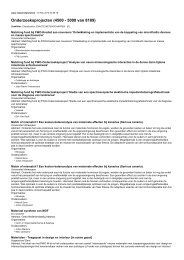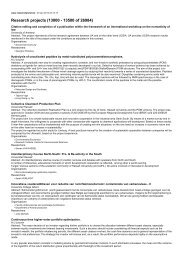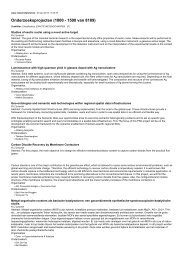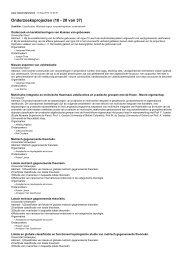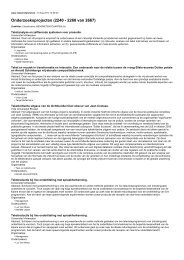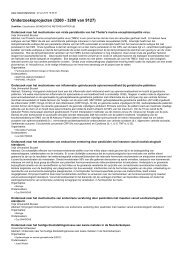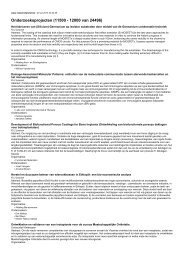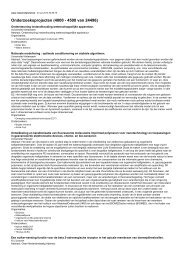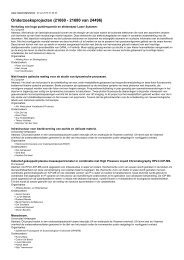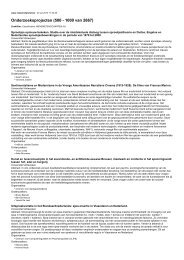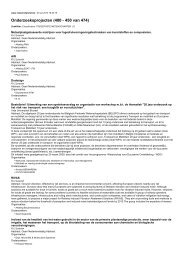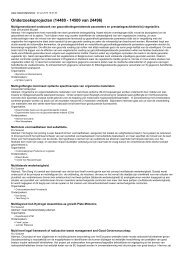Research projects (1 - 500 of 2917)
Research projects (1 - 500 of 2917)
Research projects (1 - 500 of 2917)
Create successful ePaper yourself
Turn your PDF publications into a flip-book with our unique Google optimized e-Paper software.
• Kurt Vanhoutte<br />
• Esther Tuypens<br />
Poor relief and community building in the Southern Low Countries, ca. 1300-1600.<br />
University <strong>of</strong> Antwerp<br />
Abstract: This project will study poor relief in an integrated way in three towns in the Southern Low Countries from circa 1300 to 1600 (Ghent,<br />
Mechelen and Bergues/Sint-Winoksbergen), in order to examine how, through poor relief schemes, urban communities <strong>of</strong> solidarity were shaped. I<br />
will analyze which communities were implied or shaped when it was regulated and decided who could pr<strong>of</strong>it from poor relief, and how this changed<br />
in the long run. Who had access to relief systems (and who did not) and what community thereby served as a frame <strong>of</strong> reference? Which social<br />
boundaries were created (and by whom)? Was increasing social fragmentation reflected in a fragmentation <strong>of</strong> poor relief, or was there a shift from<br />
local and particular communities to the whole city in the fifteenth and sixteenth century?<br />
Organisations:<br />
• Centre for Urban History<br />
<strong>Research</strong>ers:<br />
• Bert De Munck<br />
• Peter Stabel<br />
The Emotions <strong>of</strong> Rational Agents.<br />
University <strong>of</strong> Antwerp<br />
Abstract: The project will describe the relation <strong>of</strong> affective and rational capacities in terms <strong>of</strong> asymmetrical explanatory relations. This can be done<br />
by thinking <strong>of</strong> agents as embodied subjects, who through complex selfrepresentational and self-regulative abilities structure their actions in the light<br />
<strong>of</strong> rational considerations. This approach to the unity <strong>of</strong> the subject has historical antecedents in Fichte (1794) and Hegel (1830).<br />
Organisations:<br />
• Centre for Philosophical Psychology<br />
<strong>Research</strong>ers:<br />
• Bence Nanay<br />
'Wo mistus, da Christus'. A micro-perspective on the allocation and recycling <strong>of</strong> urban waste in the rural economy <strong>of</strong> early<br />
modern Flanders.<br />
University <strong>of</strong> Antwerp<br />
Abstract: This project aims to investigate to what extent the contribution <strong>of</strong> urban waste and manure could overcome the challenge <strong>of</strong> fundamental<br />
nutrient deficiencies in regions <strong>of</strong> dense urbanisation and intensive agriculture. In order to reach that goal, the social relations that are at the core <strong>of</strong><br />
this project, will be confronted with three other strategic factors affecting the manure allocation: transport improvements, institutional change and<br />
economic growth<br />
Organisations:<br />
• Political History<br />
<strong>Research</strong>ers:<br />
• Bruno Blondé<br />
• Tim Soens<br />
• Pieter De Graef<br />
Human capital from a household perspective: knowledge investments in early modern Antwerp, Ghent, Lier and Aalst.<br />
University <strong>of</strong> Antwerp<br />
Abstract: As evidenced by this short state <strong>of</strong> the art, there is an urgent need for a micro-level approach in which education and the mechanisms<br />
behind human capital formation are analyzed comprehensively. This project aims to fulfill this requirement by 1° introducing a new kind <strong>of</strong> source to<br />
quantify the investments in various types <strong>of</strong> education and to identify the different causal factors involved from a household perspective; and 2°<br />
analyzing the situation in four distinct early modern cities in the Southern Low Countries, the first industrializing region on the continent.<br />
Organisations:<br />
• Centre for Urban History<br />
<strong>Research</strong>ers:<br />
• Bert De Munck<br />
• Jord Hanus<br />
• Annelies De Bie<br />
The commons backstage: the social agro-system <strong>of</strong> the late medieval Campine area explored.<br />
University <strong>of</strong> Antwerp<br />
Abstract: The initial goal <strong>of</strong> this research project was to analyse actors, arguments and outcomes <strong>of</strong> conflicts regarding common pool regimes and<br />
institutions in the late medieval Campine Area, in order to reveal changing uses and expectations <strong>of</strong> the commons by different stakeholders.<br />
Organisations:<br />
• Political History<br />
<strong>Research</strong>ers:<br />
• Tim Soens<br />
• Maïka De Keyzer<br />
Singularity and Responsibility.<br />
University <strong>of</strong> Antwerp<br />
Abstract: At first glance the question <strong>of</strong> responsibility seems to be a question <strong>of</strong> freedom: is one responsible for his/her actions, because she/he has<br />
chosen these actions freely? In a recent philosophical debate that has been inspired by the philosophy <strong>of</strong> Emmanuel Levinas, responsibility is<br />
however understood as the result <strong>of</strong> a call: as a task that isn¿t the result <strong>of</strong> any free choice, but that is received in a passive way. This call is<br />
received by a singular person and has to be answered by this person only. Levinas¿ concept <strong>of</strong> responsibility has been put into question by some<br />
critics as Jean-Luc Marion and Paul Ricoeur, who doubt Levinas¿ claim that ethical responsibility (the call to do the good) can be singular. Ricoeurs<br />
and Marions criticisms point at the fundamental problem <strong>of</strong> an ethics <strong>of</strong> responsibility: how is it possible for a call that is addressed at any person, to<br />
ask for an answer that only I can give? This question will be the core <strong>of</strong> the following research project which goal consists in investigating how<br />
singularity can be considered as a condition <strong>of</strong> freedom. The project will carefully investigate the following three questions.<br />
1.) Can the call for the good be singular (i.e. unique) so that it is possible to say that it singularizes me?<br />
2.) Can a passive call for responsibility result in concrete ethical practice?<br />
3.) In what sense does freedom depend on singular ethicalacting in practice?<br />
Organisations:<br />
• Centre for Philosophy <strong>of</strong> Culture



